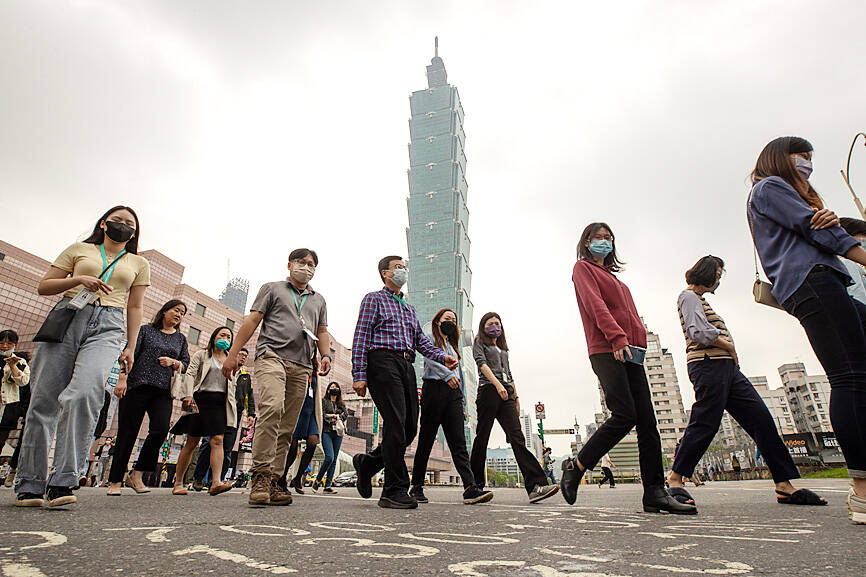Fixed investment in Taiwan passed NT$6 trillion (US$196.54 billion) for the first time last year, up more than 6 percent from a year earlier, with semiconductor suppliers planning to expand production and upgrade technologies, and as many firms join the rush to invest in 5G applications, the Ministry of Economic Affairs said in a report on Wednesday last week.
The increase reflected moves by Taiwanese firms with overseas operations to invest in Taiwan amid escalating tensions between the US and China.
Fixed investments — referring to physical assets such as machinery, land, buildings, installations, vehicles and technologies — totaled NT$6.27 trillion last year, up 6.2 percent from a year earlier, adjusted for inflation, the report said.

Photo: Ritchie B. Tongo, EPA-EFE
From 2018 to last year, fixed investment in Taiwan grew at a compound annual growth rate of 8.2 percent, well beyond the 3.3 percent experienced from 2013 to 2017, the report said.
Fixed investments last year accounted for 27.6 percent of local GDP, up from 26.1 percent in 2021.
With investment in Taiwan on the rise, the ratio was at its highest since 1994, the report said.
Local fixed investments comprised 21.8 to 27.6 percent of national GDP from 2018 to last year, compared with 21.1 to 22.7 percent from 2013 to 2017, with the higher ratio over the past five years depicting fixed investment as a local economic growth driver, it said.
Semiconductor suppliers last year poured about US$36.3 billion into production equipment imports, up 13.1 percent from a year earlier, the report said.
That amount accounted for 48.3 percent of capital equipment imports, a record indicating that tech companies are looking to expand production and upgrade technology.
The ministry said the private sector serves as a major source of fixed investment in Taiwan.
Since 2014, private companies have accounted for more than 80 percent of Taiwan’s fixed investments, it said.
From 2021 to last year, the private sector accounted for 84.6 percent of total investment in the wake of an investment surge by the semiconductor industry, while the public sector accounted for just 15.4 percent last year, the ministry said.
Enterprises in Taiwan could scale back their investments this year amid global economic uncertainty, it said.

Quanta Computer Inc (廣達) chairman Barry Lam (林百里) is expected to share his views about the artificial intelligence (AI) industry’s prospects during his speech at the company’s 37th anniversary ceremony, as AI servers have become a new growth engine for the equipment manufacturing service provider. Lam’s speech is much anticipated, as Quanta has risen as one of the world’s major AI server suppliers. The company reported a 30 percent year-on-year growth in consolidated revenue to NT$1.41 trillion (US$43.35 billion) last year, thanks to fast-growing demand for servers, especially those with AI capabilities. The company told investors in November last year that

Intel Corp has named Tasha Chuang (莊蓓瑜) to lead Intel Taiwan in a bid to reinforce relations between the company and its Taiwanese partners. The appointment of Chuang as general manager for Intel Taiwan takes effect on Thursday, the firm said in a statement yesterday. Chuang is to lead her team in Taiwan to pursue product development and sales growth in an effort to reinforce the company’s ties with its partners and clients, Intel said. Chuang was previously in charge of managing Intel’s ties with leading Taiwanese PC brand Asustek Computer Inc (華碩), which included helping Asustek strengthen its global businesses, the company

Taiwanese suppliers to Taiwan Semiconductor Manufacturing Co. (TSMC, 台積電) are expected to follow the contract chipmaker’s step to invest in the US, but their relocation may be seven to eight years away, Minister of Economic Affairs J.W. Kuo (郭智輝) said yesterday. When asked by opposition Chinese Nationalist Party (KMT) Legislator Niu Hsu-ting (牛煦庭) in the legislature about growing concerns that TSMC’s huge investments in the US will prompt its suppliers to follow suit, Kuo said based on the chipmaker’s current limited production volume, it is unlikely to lead its supply chain to go there for now. “Unless TSMC completes its planned six

Power supply and electronic components maker Delta Electronics Inc (台達電) yesterday said it plans to ship its new 1 megawatt charging systems for electric trucks and buses in the first half of next year at the earliest. The new charging piles, which deliver up to 1 megawatt of charging power, are designed for heavy-duty electric vehicles, and support a maximum current of 1,500 amperes and output of 1,250 volts, Delta said in a news release. “If everything goes smoothly, we could begin shipping those new charging systems as early as in the first half of next year,” a company official said. The new